4A朗文Chapter4和5知识点梳理
香港朗文4a各单元总结
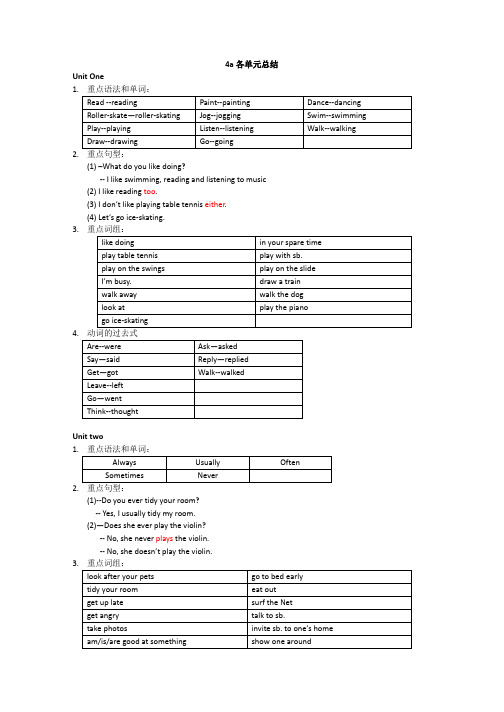
4a各单元总结Unit One1.2.重点句型:(1) –What do you like doing?-- I like swimming, reading and listening to music(2) I like reading too.(3) I don’t like playing table tennis either.(4) Let’s go ice-skating.3.4.Unit two1.2.重点句型:(1)--Do you ever tidy your room?-- Yes, I usually tidy my room.(2)—Does she ever play the violin?-- No, she never plays the violin.-- No, she doesn’t play the violin.3.4.Unit Three1.2.3.重点句型:(1)--Was there any cola when you were young?-Yes, there was.(2)The game I like best was marbles.(3)How do you play marbles?(4)– Did you wear trainers fifty years ago?--Yes, I did.(5)—Did you have a telephone?-- No, I didn’t. Rich people had telephones at home but poor people didn’t.(6 ) – Did you shop at the supermarket?--- No, I didn’t. There weren’t any supermarkets.(7) – Did you go to school?-- No, I didn’t. Rich children go to school but poor children didn’t.(8) –Did you listen to the radio?-- Yes, I did.Where(哪里)do you like going to in your holiday?How(如何)do you help at home?How much (多少钱,提问不行数名词)is it? --- It is five dollars. How many (多少,提问可数名词)books in your home?What time(什么时间)is it?What(什么)are you doing now? ----I am doing my homework. What(什么)is the weather like today? ----It’s windy.What color (什么颜色)is it? ---- It is red.What (什么)are you? ( What do you do?) -----I am a driver.When(什么时候)is your birthday? ---on 2nd MayHow old(多大)are you? ----I am ten.Who (谁) are you? -----I am David.Which(哪一个) club do you want to join?Why(为什么)do you like playing football?----Because I like being healthy.。
四年级朗文新思维英语第四章chapter4-教师版
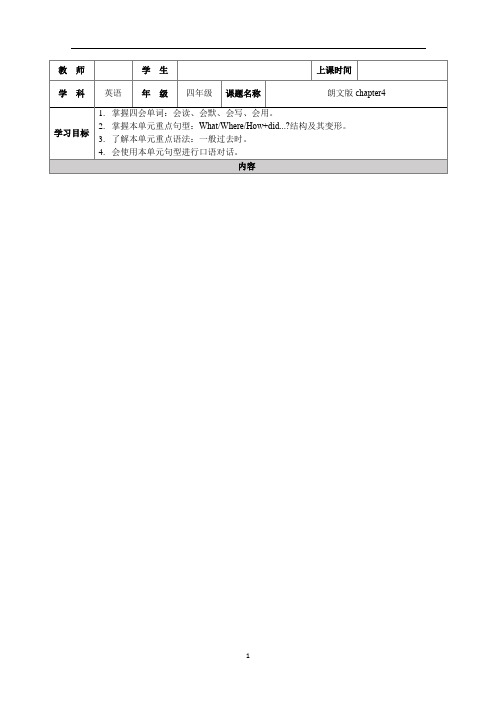
二、根据单词的正确形式填空。
1.What________(do) children do in their spare time 60 years ago?
--Most children________(play) hide-and-seek.
[作业]
请将所说短语,默写在下面横线处。
1.A:_______________________________________________
B:_______________________________________________
2.A:______________________________________________
——Most peopleworecotton clothes. Some peopleworesilk clothes.
[解析]
[翻译]——他们过去吃什么呢?
——大多数人吃粥和蔬菜,一些人吃米饭和肉。
2.“How did +主语+动词原型+其他?”表示:过去做什么怎么样?”
课文原句:——Howdidpeople travel?
B:_______________________________________________
3.A:______________________________________________
——Most peoplewalkedorrodehorses. Rich peopletravelledby sedan chair.Some people rode horses.
[解析]
[翻译]——过去人们如何做饭呢?
香港朗文4a各单元总结汇编

4a各单元总结Unit One1.重点语法和单词:2.重点句型:(1) –What do you like doing?-- I like swimming, reading and listening to music(2) I like reading too.(3) I don’t like playing table tennis either.(4) Let’s go ice-skating.3.重点词组:4.动词的过去式Unit two1.重点语法和单词:2.重点句型:(1)--Do you ever tidy your room?-- Yes, I usually tidy my room.(2)—Does she ever play the violin?-- No, she never plays the violin.-- No, she doesn’t play the violin.3.重点词组:4.动词的过去式Unit Three1.重点语法:2.重点单词和词组:3.重点句型:(1)--Was there any cola when you were young?-Yes, there was.(2)The game I like best was marbles.(3)How do you play marbles?(4)– Did you wear trainers fifty years ago?--Yes, I did.(5)—Did you have a telephone?-- No, I didn’t. Rich people had telephones at home but poor people didn’t. (6 ) – Did you shop at the supermarket?--- No, I didn’t. There weren’t any supermarkets.(7) – Did you go to school?-- No, I didn’t. Rich children go to school but poor children didn’t.(8) –Did you listen to the radio?-- Yes, I did.Where(哪里)do you like going to in your holiday?How(如何)do you help at home?How much (多少钱,提问不可数名词)is it? --- It is five dollars. How many (多少,提问可数名词)books in your home?What time(什么时间)is it?What(什么)are you doing now? ----I am doing my homework. What(什么)is the weather like today? ----It’s windy.What color (什么颜色)is it? ---- It is red.What (什么)are you? ( What do you do?) -----I am a driver.When(什么时候)is your birthday? ---on 2nd MayHow old(多大)are you? ----I am ten.Who (谁) are you? -----I am David.Which(哪一个) club do you want to join?Why(为什么)do you like playing football?----Because I like being healthy.。
朗文4A-Chapter-4复习提要

《朗文英语4A》复习提要Chapter 4:Five hundred years ago五百年之前I. 经过第4章的学习,下面的新单词我们要准确无误地读(read them correctly),知道它们的中文意思(know the Chinese meaning),不看书进行英汉互译( translate),并且还要会拼写( spell)。
cotton clothes棉质衣服silk clothes丝绸衣服a horse一匹马a sedan chair一台轿子silver and gold银子和金子paper money纸币a village 一个村子a town一个镇子II.句型。
下面的关键句型我们要会读(read), 知道意思(know the Chinese meaning),会根据不同的语境来运用(use them in different contexts),会写(write them correctly)。
1. --What did people wear 500 years ago?-- Most people wore cotton clothes.Some people wore silk clothes--五百年前人们穿什么?--大部分人穿棉质衣服。
一些人穿丝绸衣服。
2. -- How did people travel 500 years ago?--Most people walked or rode horses.Rich people travelled by sedan chairSome people travelled by boat.-- 五百年前人们怎么旅行?--大部分人步行或骑马去旅行。
富人坐轿子旅行。
一些人坐船旅行。
3.-- How did people pay for things 500 years ago? Or we can say:How did people pay 500 years ago?--Most people paid for things with silver and gold.Or we can say: Most people paid with silver and gold. --Some people paid for things with paper money.Or we can say: Some people paid with paper money. --五百年前人们怎么买东西?--大部分人用银子和金子买东西。
香港朗文英语4A-Chapter-5复习提要
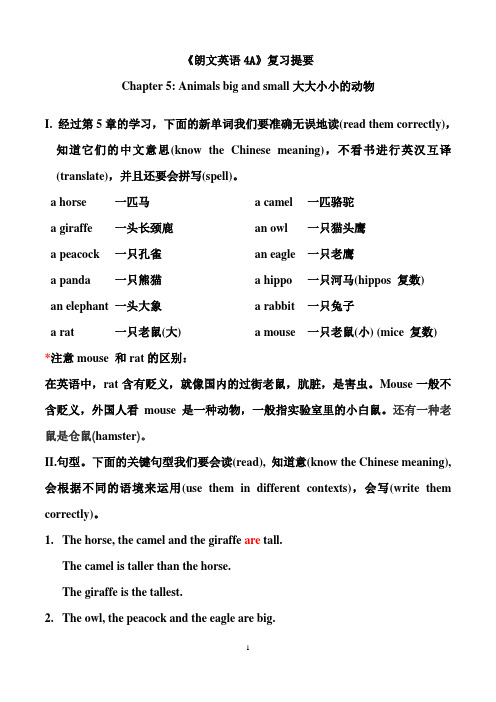
《朗文英语4A》复习提要Chapter 5: Animals big and small大大小小的动物I. 经过第5章的学习,下面的新单词我们要准确无误地读(read them correctly),知道它们的中文意思(know the Chinese meaning),不看书进行英汉互译(translate),并且还要会拼写(spell)。
a horse 一匹马 a camel 一匹骆驼a giraffe 一头长颈鹿an owl 一只猫头鹰a peacock 一只孔雀an eagle 一只老鹰a panda 一只熊猫 a hippo 一只河马(hippos 复数)an elephant 一头大象 a rabbit 一只兔子a rat 一只老鼠(大) a mouse 一只老鼠(小) (mice 复数)*注意mouse 和rat的区别:在英语中,rat含有贬义,就像国内的过街老鼠,肮脏,是害虫。
Mouse一般不含贬义,外国人看mouse是一种动物,一般指实验室里的小白鼠。
还有一种老鼠是仓鼠(hamster)。
II.句型。
下面的关键句型我们要会读(read), 知道意(know the Chinese meaning), 会根据不同的语境来运用(use them in different contexts),会写(write them correctly)。
1. The horse, the camel and the giraffe are tall.The camel is taller than the horse.The giraffe is the tallest.2. The owl, the peacock and the eagle are big.The peacock is bigger than the owl.The eagle is the biggest.3. The panda, the hippo and the elephant are heavy.The hippo is heavier than the panda.The elephant is the heaviest.4. The rabbit, the rat and the mouse are small.The rat is smaller than the rabbit.The mouse is the smallest.总结: (1). 比较级结构:A+ be+ adj.er + than+ B. : A比B……be动词由时态和主语A决定。
最新香港朗文4A各单元知识要点 词汇语法
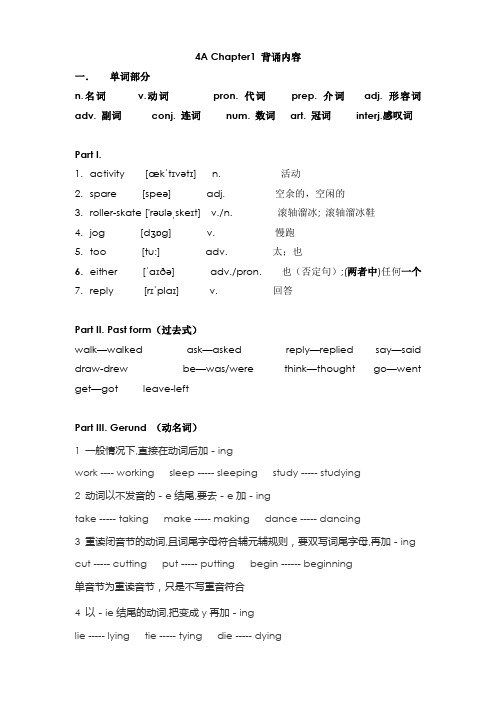
4A Chapter1 背诵内容一.单词部分n.名词v.动词pron. 代词prep. 介词adj. 形容词adv. 副词conj. 连词num. 数词art. 冠词interj.感叹词Part I.1.activity [ækˈtɪvətɪ] n. 活动2.spare [speə] adj. 空余的,空闲的3.roller-skate ['rəʊləˌskeɪt] v./n. 滚轴溜冰; 滚轴溜冰鞋4.jog [dʒɒg] v. 慢跑5.too [tu:] adv. 太;也6.either [ˈaɪðə] adv./pron. 也(否定句);(两者中)任何一个7.reply [rɪˈplaɪ] v. 回答Part II. Past form(过去式)walk—walked ask—asked reply—replied say—said draw-drew be—was/were think—thought go—went get—got leave-leftPart III. Gerund (动名词)1 一般情况下,直接在动词后加-ingwork ---- working sleep ----- sleeping study ----- studying2 动词以不发音的-e结尾,要去-e加-ingtake ----- taking make ----- making dance ----- dancing3 重读闭音节的动词,且词尾字母符合辅元辅规则,要双写词尾字母,再加-ing cut ----- cutting put ----- putting begin ------ beginning单音节为重读音节,只是不写重音符合4 以-ie结尾的动词,把变成y再加-inglie ----- lying tie ----- tying die ----- dying二.词组部分1.i n one’s spare time在某人的空余时间2.listen to (the) music 听音乐3.play chess 下棋4.like/love/enjoy doing 喜欢干某事5.go swimming (去)游泳6.go jogging (去)慢跑7.go roller-skating (去)溜冰8.be good at sth./doing 擅长于某事/干某事9.be poor at sth./doing 不擅长于某事/干某事10.be interested in sth./doing 对干某事/干某事感兴趣11.be afraid of sth./doing 害怕某事/干某事12.at/on the weekend 在周末at/on weekends13.on weekdays 在工作日14.be busy with sth. 忙于某事15.be busy doing 忙于干某事16.enjoy oneself= have a good time 某人玩得很开心17.a family helper 一位家庭帮手18.pick up kids 接小孩19.play the piano/violin 弹钢琴,拉小提琴(西洋乐器名词前加the )20.play Erhu 拉二胡(民族乐器前无the)21.play table tennis 打羽毛球(球类名词前无the)22.play on the swing/slide 在秋千(滑滑梯)上玩23.play with sb. 与某人一起玩24.play with sth. 玩耍某物25.a bit later 一会儿以后26.walk away sadly 难过地走开了27.walk the dog 溜狗28.walk home=go home on foot 走回家29.go home =go back home 回家30.after that 在那以后31.the black notes (钢琴上)黑键32.see sb. doing 看到某人在干某事33.make a new friend named Tom 交了一个叫汤姆的朋友34.in fact = actually/ˈæktʃʊəlɪ/事实上35.in the gym 在体育馆36.indoor stadium /'steɪdɪəm/ 室内体育馆37.finish sth./doing sth. 完成某事/干某事38.be important to sb. 对某人而言是重要的(绿色字体部分为拓展内容,供学有余力的小朋友默写。
最新香港朗文4A各单元知识要点词汇语法

最新香港朗文4A各单元知识要点词汇语法以下是最新版香港朗文4A各单元的词汇和语法要点:Unit 1: Going Places- 词汇:transportation(交通工具),destination(目的地),navigate(导航),explore(探索)- 语法:一般现在时,there is / there are句型,情态动词can的用法Unit 2: Nature's Forces- 词汇:natural disasters(自然灾害),flood(洪水),earthquake(地震),hurricane(飓风),volcano(火山)- 语法:一般过去时,情态动词must / mustn't的用法Unit 3: Materials and Properties- 词汇:materials(材料),properties(特性),solid(固体),liquid(液体),gas(气体)- 语法:现在进行时,情态动词should / shouldn't的用法Unit 4: Diverse Cultures- 词汇:diverse(多样化的),culture(文化),tradition(传统),custom(风俗),celebration(庆祝活动)- 语法:现在完成时,情态动词could / couldn't的用法Unit 5: The Arts- 词汇:artistic(艺术的),creative(创造性的),performance(表演),sculpture(雕塑),painting(绘画)-语法:一般将来时- 语法:过去进行时,情态动词may / must的用法以上是最新香港朗文4A各单元的词汇和语法要点。
请注意,这些要点可能会因版本差异而有所变化,建议参考最新教材或教师的指导。
香港朗文英语4A Chapter 5复习提要
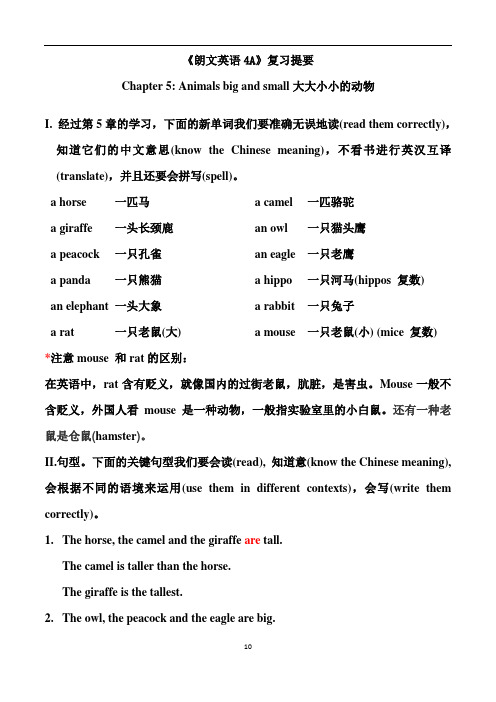
《朗文英语4A》复习提要Chapter 5: Animals big and small大大小小的动物I. 经过第5章的学习,下面的新单词我们要准确无误地读(read them correctly),知道它们的中文意思(know the Chinese meaning),不看书进行英汉互译(translate),并且还要会拼写(spell)。
a horse 一匹马 a camel 一匹骆驼a giraffe 一头长颈鹿an owl 一只猫头鹰a peacock 一只孔雀an eagle 一只老鹰a panda 一只熊猫 a hippo 一只河马(hippos 复数)an elephant 一头大象 a rabbit 一只兔子a rat 一只老鼠(大) a mouse 一只老鼠(小) (mice 复数)*注意mouse 和rat的区别:在英语中,rat含有贬义,就像国内的过街老鼠,肮脏,是害虫。
Mouse一般不含贬义,外国人看mouse是一种动物,一般指实验室里的小白鼠。
还有一种老鼠是仓鼠(hamster)。
II.句型。
下面的关键句型我们要会读(read), 知道意(know the Chinese meaning), 会根据不同的语境来运用(use them in different contexts),会写(write them correctly)。
1. The horse, the camel and the giraffe are tall.The camel is taller than the horse.The giraffe is the tallest.2. The owl, the peacock and the eagle are big.The peacock is bigger than the owl.The eagle is the biggest.3. The panda, the hippo and the elephant are heavy.The hippo is heavier than the panda.The elephant is the heaviest.4. The rabbit, the rat and the mouse are small.The rat is smaller than the rabbit.The mouse is the smallest.总结: (1). 比较级结构:A+ be+ adj.er + than+ B. : A比B……be动词由时态和主语A决定。
- 1、下载文档前请自行甄别文档内容的完整性,平台不提供额外的编辑、内容补充、找答案等附加服务。
- 2、"仅部分预览"的文档,不可在线预览部分如存在完整性等问题,可反馈申请退款(可完整预览的文档不适用该条件!)。
- 3、如文档侵犯您的权益,请联系客服反馈,我们会尽快为您处理(人工客服工作时间:9:00-18:30)。
4A朗文Chapter4 和5知识点梳理【必讲知识点】
1. 辨析 few , afew , little , alittle :
few极少,几乎没有表示“否定”意义接可数名词复数形式
afew少许表示“肯定”意义接可数名词复数形式
little极少,几乎没有表示“否定”意义接不可数名词
alittle少许表示“肯定”意义接不可数名称
2. fewer与less都可以表示“更少”
(1) fewer后接可数名词的复数形式,是few的比较级
(2) less后接不可数名词,是little的比较级
3. 辨析 much , manP, somuch 与 somanP
somuch如此多接不可数名词
somanP如此多接可数名词的复数形式
much许多接不可数名词
manP许多接可数名词的复数形式
4. alotof=lotsof 表示许多,后可接可数名词的复数形式以及不可数名词
5. stop 用法
stoptodo 停止去做另外一件事
stopdo ing 停止做某事(指手头的事)
6. Therebe句型的一般过去时
1 .肯定式
therebe句型的一般过去时表示过去某地或某时存在某人或某物,其一般过去时态的陈述句由“thewas /were +主语+地点状语+时间状语”构
成。
therewas后接单数名词;therewere 后接复数名词。
例如:
Therewasacar un derthetreeamome ntago. 冈H才这棵树下有一辆小轿车。
Thereweretwoforeig nteachers ino urschoollastPear. 去年我们学校有两名外教。
2 .否定式
therebe句型一般过去时的否定式是在动词 was或were的后面加not,可缩写为
wasn 't或 weren ' t。
例如:
Therewasn ' tafilminthecinemalast night.昨晚电影院里没有演电影。
Thereweren ' tahwomendoctorsthen. 当时没有女大夫。
3 .一般疑问式及其回答
therebe句型一般过去时的一般疑问式是将动词was或were放在there之
、八
刖。
肯定回答用“ Pes,therewas /were.;否定回答用“No,therewasn ' t / were n t. 。
例如:
①一Wasthereama nin theroomjust now? 刚才房间里有位男子吗?
—Pes,therewas. 是的,有一位。
②一Weretherea nPgirlsi ngersi nPourclasslastPear? 去年你们班有女歌手
吗?
—No,thereweren ' t.不,没有。
4 •特殊疑问式及其回答
therebe句型一般过去时的特殊疑问式由“疑问词+ was/were + there + 地点状语+
时间状语”构成,有时地点状语和时间状语可省略。
答语不能使用Pes或No,需视情况直接回答。
例如:
①一WhPwastheresomuchwater? (这里)为什么有那么多水?
—Itwasrai nin gjust now. (因为)刚才下雨了。
②一Howma nPpeoplewerethere in Pourclasslastterm? 上学期你们班有多
少人?
—TherewereFiftP .(有)五十个。
对应练习
下列各句均有一处错误,请指出并改正。
1. Therewasthreeme nan dachildi ntheroomjust now.
2. There no twerea nPpeopleherelast ni ght.
3. —WeretheretwoboPs un derthetree ?
—Pes,thePwere .
4. Howmuchbreadwerethere on thetablePesterdaP?
总练习:
一、单选题。
()1.Thereisstill __ uice in thebottle.
A.few
B.alittle
C.little
D.few
()2.Weshouldeat vegetablesand ________ meat.
A.more,less
B.ma nP,less
C.more,little
D.more,few ()3.DoingeGerciseeverPdaPcanhelptostaP ____ .
A.health
B.healthP
C.fat
D.thin
()4.Sausagestaste _____ .
A.well
B.delicious
C. ni celP
()5」haveapplesa ndwater.
A.few,less
B.little,few
C.few,little
D.less,fewer ()6.Shewill _ able _____ p laPwithherfrie nds.
A.is,to
B.be,to
C.be,i n
D.is,in
()7.Pouhavetoeat fruitand ________ vegetablesthan before.
A.much
B.ma nP
C.moreD .1 ess
()8.Thedumplingsare _________ than the no odles.
A.more nicer
B.moredelicious
C.verP nice
D.delicious
()9.Shewrites ________ thanl.
A.morecareful
B.muchcarefuI
C.muchcarefullP
()10.Ahorseis ________ than adog.
A.muchheavP
B.moreheavier
C.muchheavier
、根据中文完成句子。
1. 他星期一比星期二吃更少的香肠。
Hehad __________________ onMondaP __________ o n TuesdaP.
2. 我们应该多吃水果和蔬菜。
Weshouldeat ____________________________________ .
、按要求改写句子。
1. Thereweresome.
否定句:_____________________________________________________ 一般疑问句:_________________________________________________
肯、否定回答:_______________________________________________ 2. Therewasacari nfron tofthehousejust now.
否定句:_____________________________________________________ 一般疑问句:_________________________________________________ 肯、否定回答:_______________________________________________。
